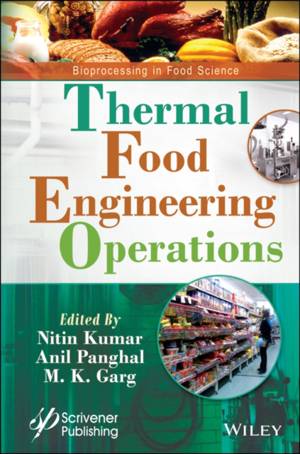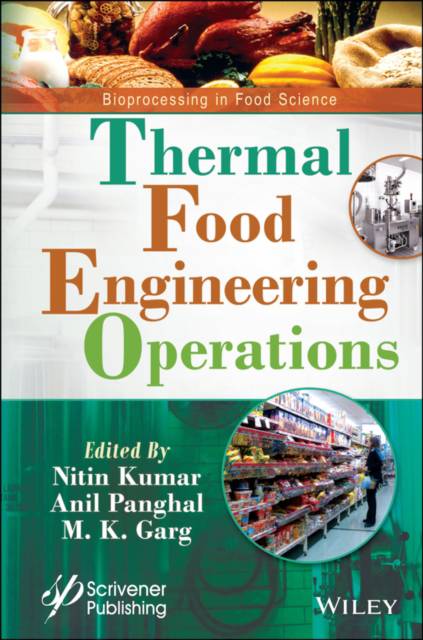
- Retrait gratuit dans votre magasin Club
- 7.000.000 titres dans notre catalogue
- Payer en toute sécurité
- Toujours un magasin près de chez vous
- Retrait gratuit dans votre magasin Club
- 7.000.0000 titres dans notre catalogue
- Payer en toute sécurité
- Toujours un magasin près de chez vous
Description
Presenting cutting-edge information on new and emerging food engineering processes, Thermal Food Engineering Operations, the first volume in the new series, "Bioprocessing in Food Science," is an essential reference on the modeling, quality, safety, and technologies associated with food processing operations today.
As the demand for healthy food increases in the current global scenario, manufacturers are searching for new possibilities for occupying a greater share in the rapidly changing food market. Compiled reports and updated knowledge on thermal processing of food products are imperative for commercial enterprises and manufacturing units. In the current scenario, academia, researchers, and food industries are working in a scattered manner and different technologies developed at each level are not compiled to implement for the benefits of different stakeholders. However, advancements in bioprocesses are required at all levels for the betterment of food industries and consumers. This series of groundbreaking edited volumes will be a comprehensive compilation of all the research that has been carried out so far, their practical applications, and the future scope of research and development in the food bioprocessing industry.
This first volume includes all the conventional and novel thermal technologies based on conduction, convection, and radiation principles and covers the basics of microbial inactivation with heat treatments, aseptic processing, retorting, drying, dehydration, combined high-pressure thermal treatments, and safety and quality concerns in food processing. Before studying the novel non-thermal processes and the concept of minimal processing, comprehensive knowledge about the conventional thermal technologies is desired along with benefits, constraints, equipment, and implementation of these technologies. Whether for the engineer, scientist, or student, this series is a must-have for any library.
This outstanding new volume:
- Discusses food safety and quality and thermal processing, laying the groundwork for further study and research
- Provides case studies of solid-liquid and supercritical fluid extraction
- Explores pasteurization, ohmic heating, irradiation, and more
- Presents cutting-edge information on new and emerging food engineering processes
Audience: Process and chemical engineers, chemists, engineers in other disciplines, managers, researchers, scientists, students, and teachers working in the field of food engineering and processing
Spécifications
Parties prenantes
- Auteur(s) :
- Editeur:
Contenu
- Nombre de pages :
- 496
- Langue:
- Anglais
Caractéristiques
- EAN:
- 9781119775591
- Date de parution :
- 19-04-22
- Format:
- Livre relié
- Format numérique:
- Genaaid
- Dimensions :
- 161 mm x 237 mm
- Poids :
- 784 g

Les avis
Nous publions uniquement les avis qui respectent les conditions requises. Consultez nos conditions pour les avis.






